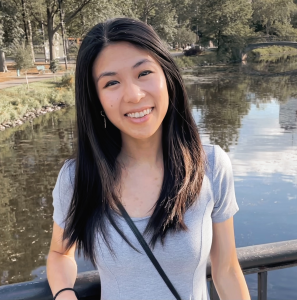PACS news / March 8, 2022
Stanford PACS Announces Winter 2022 Small Grant Winners
Stanford PACS is excited to share our four Small Grant winners: Angela Lee, Hanna Folz, and Kimya Loder. The Small Grants program provides undergraduate and graduate students with the opportunity, on a quarterly basis, to fund research projects in the areas of philanthropy and civil society. As part of the award experience, these researchers are also welcomed into the larger Stanford PACS community and have the opportunity to collaborate with established scholars, practitioners, and leaders of social change.
Research Project
| Angela Lee’s project will evaluate the impact of a novel, gamified intervention to build disinformation resilience in children and adolescents, using a randomized control trial. Previous work suggests that digital media literacy interventions are effective at increasing discriminant trust in credible information and effective detection of disinformation. However, few studies have addressed the need to create engaging, developmentally appropriate content to help young students build and retain necessary skills. Consisting of a 45-minute educational video-game, her intervention will teach students the digital media literacy skills (e.g., critical thinking, lateral reading) they need to discern between true and false information online. |

Angela Lee (she/her) is a third-year PhD Candidate in the Department of Communication, where she works in the Social Media Lab. Her research program focuses on understanding the psychology of technology to design rigorous interventions that improve people’s digital well-being at scale. She is particularly interested in working with youth and communities of color.
Research Project
| Hanna’s project is a field experiment on the effect of Facebook political advertisements on elections and polarization in Hungary’s April 2022 parliamentary election. The field experiment seeks to reduce the presence of political ads on voters’ Facebook feed prior to the election to estimate the influence of Facebook political advertising on voters’ turnout and vote choice and political polarization, and determine whether the opposition or governing party benefits from Facebook as an important campaign platform. This project presents a unique opportunity to understand the effects of social media on electoral politics in competitive authoritarian regimes. Because Hungary’s competitive authoritarian regime has served as a model for leaders with autocratic tendencies in fragile democracies, the findings could help understand electoral dynamics and the role of Facebook in upcoming high-stakes elections across the globe and would shed light on how social media may counter or exacerbate democratic backsliding. By doing so, its findings will help civil society and pro-democracy actors develop effective social media strategies in competitive authoritarian and democratic backsliding countries.” and interviews with both crossover youth and state actors, the project advances existing research that primarily relies on administrative data to test associations between court involvement and youth outcomes or prior ethnographic studies that focus on either one set of actors or a single state institution. Because crossover youth are perceived as needing both protection and discipline, they illuminate fundamental tensions in how the state operates, particularly in its regulation of marginalized populations. More broadly, the project will grant insight into how early socialization within state institutions influences young people’s later civic engagement, thereby illuminating processes that may inhibit or promote the functioning of democracy. |

Hanna Folsz is a PhD student in Stanford’s Political Science Department. Her research interests are focused on the political economy of accountability, corruption, and democratic backsliding. Hanna’s research studies the determinants of effective democratic accountability, drivers of democratic erosion, and tools to counter democratic backsliding processes, with a particular interest in the role of social media and news media.
Prior to Stanford she received an MSc in Political Science and Political Economy from the London School of Economics and a B.A. in Economics and Politics from Durham University. At Stanford, she is affiliated with the Democracy and Polarization Lab and the Poverty and Governance Lab.
Research Project
| Kimya’s project seeks to reveal how sexuality, gender, and race-based systems of oppression shape the field level outcomes of organizations by mediating their proximity to power, status, and resources. This ethnographic study responds to the following questions: How do marginalized organizations gain a competitive advantage within their local organizational fields? What strategies do that they adopt? What are the implications of these strategies on their ability to achieve organizational goals? (i.e., maintaining their autonomy, gaining social and political influence, acquiring resources for their communities). By shifting our lens, we can better understand the organizational behavior of groups that have been rendered invisible, positioning us to enhance the democratic participation of all citizens.” |

Kimya Loder is a sociology Ph.D. candidate who is broadly interested in understanding how highly stigmatized groups organize and build political power. links models of organizational behavior to the theories of race, gender, and sexuality-based inequality offered by feminist and race scholars by examining the hierarchies that emerge as differently advantaged organizations compete for power, status, and resources. Her current ethnographic study uses fieldwork, oral history interviews, and archival methods to amplify the work of Black transgender led organizations in the U.S. South. This investigation is animated by the following questions (1) What place-based factors create constraints and openings for political engagement among Black transgender women in the U.S. South? (2) What strategies do they use navigate contentious social, cultural, and political landscapes? and (3) What alliances and partnerships do they leverage to build community and achieve their political goals?
Kimya holds a Master of Arts in sociology and is a Phi Beta Kappa, summa cum laude graduate of the historic Spelman College in Atlanta, Georgia. She enjoys watching movies, gardening, and designing digital content.
